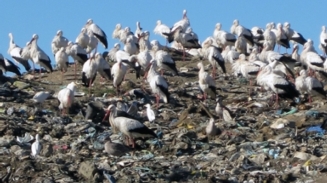
白鹤沉迷拾荒
Garbage Pickings Get Storks to Stop Migrating
白鹤沉迷拾荒
Some white storks have stopped migrating from Europe to sub-Saharan Africa in the winter, because of the availability of food in landfills.
部分白鹤停止在冬天从欧洲迁徙到撒哈拉以南的非洲,原因在于堆填区有食物。
撰文/播音 Cynthia Graber
翻译 Meatle
审核 邰伦玥
Humans aren’t the only creatures who love junk food—many animals are known to enjoy sifting through our garbage to find edible treats. And now we learn that some storks have stoppedmigrating from Europe to sub-Saharan Africa in the winter—they’d rather feed at landfills.
人类并不是仅有的垃圾食品爱好者——好多动物都乐于在我们的垃圾中寻找食物。而现在,我们知道一些鹤宁愿留在堆填区寻找食物,而取消冬季从欧洲迁徙到撒哈拉以南的非洲的计划。
“They use landfill sites heavily during the winter and they travel very long distance to get to the sites.”
“它们在冬季重度依赖堆填区,甚至飞越相当长的距离以到达这些地点。”
Aldina Franco of the University of East Anglia, one of the scientists who studied the storks’ use of landfills in Portugal. GPS tracking devices on 17 birds showed that the landfill life might mean up to 100-kilometer round-trips to feed—healthy distances, but far shorter than their historic migration routes.
东安吉利亚大学(University of East Anglia)的艾迪娜·弗朗哥(Aldina Franco),一位研究鹤类如何利用葡萄牙堆填区的科学家。17只鹤身上的GPS所记录到的运动路线表明了,堆填区的生活方式包含了两程共100公里左右的美食之旅——这个运动量挺合适,但远少于它们过去的迁徙路径的长度。
“And also they use the nests throughout the year and look after the nests. So these resident birds are in perfect condition, they are always ready to start breeding. So as soon as spring arrives they’re ready to go, the nest is in good condition, and they start breeding earlier.”
The number of storks overwintering in Portugal has shot up from fewer than 2,000 in 1995 to 14,000 in 2014. The increase appears to reflect both changes in behavior and a booming stork population in general. The study is in the journal Movement Ecology. [Nathalie I. Gilbert et al, Are white storks addicted to junk food? Impacts of landfill use on the movement and behaviour of resident white storks (Ciconia ciconia) from a partially migratory population]
“同时它们全年都要使用和维护鸟巢。因而这些定居的鸟儿状态极佳,总是准备着开始生育。只需等待春季的来临,鸟巢和鸟儿都准备好了,这些鹤就能较以往更早地开始生育。”在葡萄牙过冬的鹤从1995年的2000只飙升到2014年的14000只。这个数量的上升是行为改变和种群增长的共同结果。该项研究发表在《运动生态学》上。(Movement Ecology)
The Portuguese landfills are slated to close in 2018, with the trash diverted to covered recycling and composting facilities. How will the storks respond? Franco thinks they’ll get back to basics.
葡萄牙当地的堆填区将于2018年关闭,其中的垃圾将被用于回收和复合肥生产。鹤将如何应对?弗朗哥认为它们会恢复本来的习惯。
“So the storks are social animals. They live in colonies. They migrate in groups. So potentially as long as there are a few birds that still know the route, they can teach the ones that are currently residents how to migrate.”
“鹤是社会性动物,它们聚落而居,结团迁徙。因此只需存在少部分的鹤仍记得以往的路线,它们就能教育那些定居者如何迁徙。”
未经书面许可任何人不得复制或镜像
京ICP备11000850号-1
 京公网安备11010502039775号
京公网安备11010502039775号 信息网络传播视听节目许可证0111611号
国家科技基础条件平台

















